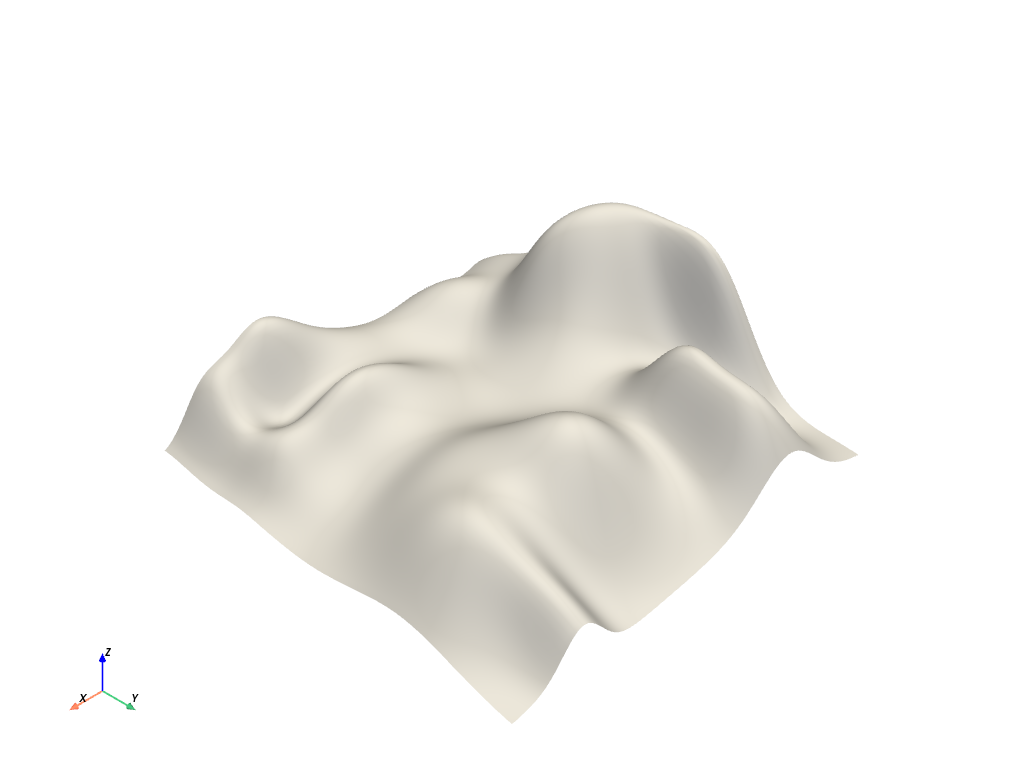pyvista.ParametricRandomHills#
- ParametricRandomHills(numberofhills=None, hillxvariance=None, hillyvariance=None, hillamplitude=None, randomseed=None, xvariancescalefactor=None, yvariancescalefactor=None, amplitudescalefactor=None, number_of_hills=None, hill_x_variance=None, hill_y_variance=None, hill_amplitude=None, random_seed=None, x_variance_scale_factor=None, y_variance_scale_factor=None, amplitude_scale_factor=None, **kwargs)[source]#
Generate a surface covered with randomly placed hills.
ParametricRandomHills generates a surface covered with randomly placed hills. Hills will vary in shape and height since the presence of nearby hills will contribute to the shape and height of a given hill. An option is provided for placing hills on a regular grid on the surface. In this case the hills will all have the same shape and height.
- Parameters:
- numberofhills
int, default: 30 The number of hills.
Changed in version 0.43.0: The
numberofhillsparameter has been renamed tonumber_of_hills.- hillxvariance
float, default: 2.5 The hill variance in the x-direction.
Changed in version 0.43.0: The
hillxvarianceparameter has been renamed tohill_x_variance.- hillyvariance
float, default: 2.5 The hill variance in the y-direction.
Changed in version 0.43.0: The
hillyvarianceparameter has been renamed tohill_y_variance.- hillamplitude
float, default: 2 The hill amplitude (height).
Changed in version 0.43.0: The
hillamplitudeparameter has been renamed tohill_amplitude.- randomseed
int, default: 1 The Seed for the random number generator, a value of 1 will initialize the random number generator, a negative value will initialize it with the system time.
Changed in version 0.43.0: The
randomseedparameter has been renamed torandom_seed.- xvariancescalefactor
float, default: 13 The scaling factor for the variance in the x-direction.
Changed in version 0.43.0: The
xvariancescalefactorparameter has been renamed tox_variance_scale_factor.- yvariancescalefactor
float, default: 13 The scaling factor for the variance in the y-direction.
Changed in version 0.43.0: The
yvariancescalefactorparameter has been renamed toy_variance_scale_factor.- amplitudescalefactor
float, default: 13 The scaling factor for the amplitude.
Changed in version 0.43.0: The
amplitudescalefactorparameter has been renamed toamplitude_scale_factor.- number_of_hills
int, default: 30 The number of hills.
- hill_x_variance
float, default: 2.5 The hill variance in the x-direction.
- hill_y_variance
float, default: 2.5 The hill variance in the y-direction.
- hill_amplitude
float, default: 2 The hill amplitude (height).
- random_seed
int, default: 1 The Seed for the random number generator, a value of 1 will initialize the random number generator, a negative value will initialize it with the system time.
- x_variance_scale_factor
float, default: 13 The scaling factor for the variance in the x-direction.
- y_variance_scale_factor
float, default: 13 The scaling factor for the variance in the y-direction.
- amplitude_scale_factor
float, default: 13 The scaling factor for the amplitude.
- **kwargs
dict,optional See
surface_from_para()for additional keyword arguments.
- numberofhills
- Returns:
pyvista.PolyDataParametricRandomHills surface.
Examples
Create a ParametricRandomHills mesh.
>>> import pyvista as pv >>> mesh = pv.ParametricRandomHills() >>> mesh.plot(color='w', smooth_shading=True)
